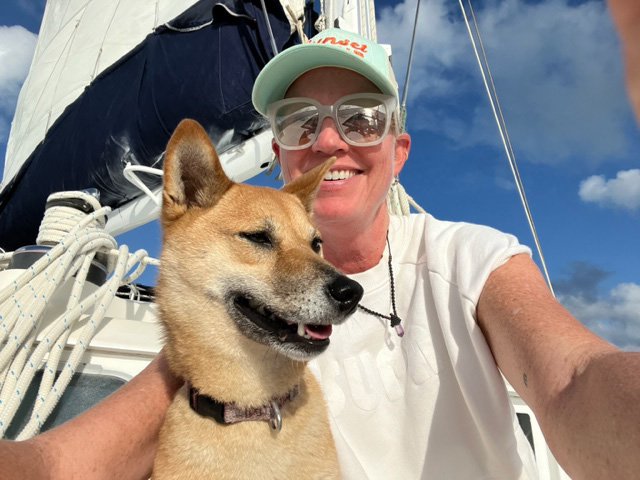Lessons Learned in Mexico
For the past three months, I’ve been living in Puerto Morelos, Mexico, a small fishing village midway between Cancun and Playa Del Carmen. This was not my original plan.
I’m a single mom with a 19-year-old son who will begin college in the fall and I wanted to experiment with being a snowbird.
So I flew down here on Christmas day with my dog Shiva with plans to stay and work remotely for three weeks. My son’s dad lives near us in Boston, and we thought he could manage on his own.
Well, he sure did! Two weeks in and he said, “Mom, you don’t really need to rush back, I’m doing fine.” Okay, I admit it hurt a bit to hear how little he needed me.
But as I thought more about it, I realized that micromanaging when parenting is no more productive than micromanaging when leading an organization. In both cases, if we can allow ourselves to let go and give others the support and space they need, they will thrive.
That’s not all I’ve learned in my time here. Much of what I have seen and experienced in Mexico has altered my view of both my own work and that of my nonprofit clients…
Here, Everything is Really Slow
If you get one thing done in Mexico, it’s a good day.
For example, I’m renting a house and there are some plumbing issues. All week long, the plumber said he was coming today. Five days later, he finally arrived.That’s just the culture; I’ve had to slow down and lower my East Coast-paced expectations.
Compare that to the sheer number of things that a typical leader back home has on their plate. It’s never-ending and the result, often, is that 20 things get done, but in a half-assed way.
Maybe one or two things done well each day is a better target.
Listening Has Power
I’m taking classes, but I am far from fluent in Spanish. Since many people here don’t speak a word of English, I have learned to listen really, really well.
As a leader, active listening — not simply making assumptions and interpretations that blind us from seeing things as they really are — is also essential.
Recently, I was coaching a CEO who was talking about his Director of Development. I noticed he had a lot of beliefs about her behavior and her motivations. I kept asking, “Is that really true?”
That simple question caused him to reflect on their interactions. He realized he needed to go back and have another conversation with her in which he could ask clarifying questions and make sure they were both on the same page.
Ask. If You Don’t Receive, Ask Again, Nicely
My plumber did eventually show up, but only because I was persistent and respectful in asking. Persistent and respectful — not loud and obnoxious.
Likewise, when we delegate or ask someone to do something and notice it’s not getting done, we need to begin with the assumption that there is something going on in their life. Maybe they don’t know how to do what’s been asked and are embarrassed to say so. Maybe they have too much on their plate already and don’t want to tell you.
Whatever the reason, it’s best to begin with the intention of preserving the relationship and avoid humiliating the other person.
Self-Care Maximizes Productivity
Here, everyone takes a siesta.
The tradespeople arrive early in the morning, leave at 2pm to have lunch and take a nap, and then return at 4 and work until 7. They don’t progressively fade as the day goes on; they come back in the afternoon rested, mentally and physically.
What is your “afternoon siesta?” What do you do for yourself each day that allows you to replenish and remain productive as the days, weeks, and months roll on?
Don’t be Afraid to Ask for Help
Down here, I am out of my element. I don’t speak the language, I don’t understand the culture, I don’t have access to the same network of resources that I have back home.
So I ask for help and guidance. All the time. And it was really hard at first!
Leaders don’t need to have all the answers, either. As Brené Brown has pointed out countless times, “We all struggle with things, but sharing them is not a sign of weakness. It's a compelling way to build trust.”
Ask for help from your board, your staff, your colleagues. When we have the courage to reveal that we don’t know everything, we connect at a deeper level and our teams perform better as a result.
Above All, Do What You Love
It’s a cliché to observe how unhappy Americans seem to be, despite all the material benefits we enjoy. But when you live in Mexico for a few months, the contrast is unavoidable.
People here are demonstrably happy. They seem to love what they do, enjoy who they are, and bask in the strong culture of family and friends. I am reminded daily that life is short and not for wasting.
But we often get so caught up in our jobs and to-do lists that we lose track of the mission and purpose — of the organization and of our lives. And after all, isn’t mission and purpose why we work for nonprofits in the first place?
For me, these past three months have been eye-opening. My hope and intention is to remember the lessons I’ve learned in Mexico when I get back home in April. I also look forward to attending my son’s high school graduation!



